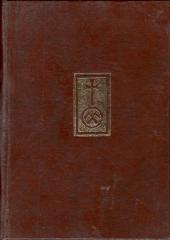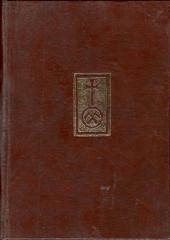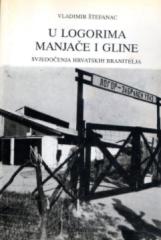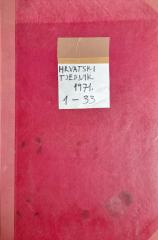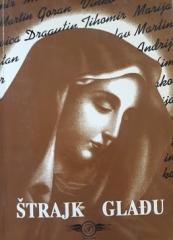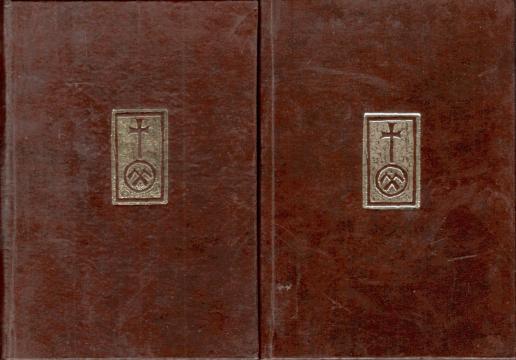
Spovid općena
Reprint knjige „Spovid općena“ (1496), prve štampane knjige na hrvatskom jeziku i u glagoljici. Veoma retko bibliofilsko izdanje. Reprint glagoljskog teksta u jednoj knjižici, a u drugoj latinski prepis, priredila Anica Nazor.
„Spovid općena“ (1496), prva štampana knjiga na hrvatskom jeziku i glagoljici, značajan je spomenik hrvatske književnosti i štamparstva. Štampana je u senjskoj glagoljskoj štampariji, drugoj takvoj štampariji u Hrvatskoj posle Kosinja, koja je radila od 1494. do 1508. godine. Knjiga je prevod popularnog franjevačkog priručnika Confessionale generale milanskog propovednika Mikelea Karkana, a preveo ju je Jakov Blažiolović, kasnije senjski biskup. Tekst je napisan na čakavskom dijalektu sa elementima staroslovenskog jezika i italijanizama, što pokazuje jezičku raznolikost i trud u oblikovanju hrvatske teološke terminologije. Sadrži 36 listova (71 stranica) i štampana je monohromatski, u crnoj boji, u malom formatu na papiru, bez grafičkih ukrasa, sa tekstom raspoređenim u 25 redova po stranici. Jedini sačuvani primerak čuva se u biblioteci Samostana Svetog Franje Ksaverskog u Zagrebu. U kolofonu knjige navodi se da ju je štampao Blaž Baromić 25. aprila 1496. godine u Senju.
Opšta ispovest je napisana u kontekstu potrebe za priručnikom koji bi sveštenicima olakšao obavljanje sakramenta ispovesti. Prevod Jakova Blažiolovića zasnovan je na Carcanovom delu, koje je bilo široko korišćeno u Evropi. Knjiga pruža uputstva za ispovednike, spiskove grehova prema Deset zapovesti i Sedam smrtnih grehova, i moralne smernice, odražavajući srednjovekovnu crkvenu praksu. Štampanje je omogućilo širu distribuciju, dajući glagoljici standardizovan tekst za pastirski rad. Značaj knjige leži u njenoj ulozi kao prve neliturgijske inkunabule na hrvatskom jeziku, ističući kulturni i jezički identitet Hrvata.
Senjsku štampariju osnovao je senjski kanonik Blaž Baromić, koji je 1493. godine u Veneciji, u štampariji Andrije Torezanija, stekao znanje o štamparskom zanatu i nadgledao štampanje glagoljskog Baromićevog brevijara. Godine 1494. osnovao je štampariju u Senju, pored zvonika senjske katedrale, u kući arhiđakona Silvestra Bedričića, vlasnika štamparije. Štamparija je koristila glagoljska slova doneta iz Venecije, a Baromić je dizajnirao grafički inventar, uključujući jedinstvene znakove za poluslova, što je omogućavalo fleksibilne kombinacije grupa slova – inovaciju u evropskoj štampi tog vremena. Štamparija je proizvela sedam dela od 1494. do 1508. godine, uključujući Senjski glagoljski misal (1494), Opštu ispovest (1496), Tranzit Svetog Jeronima (1508), Čuda Presvete Bogorodice (1507), Plebanski red (1507), Učitelja dobrih mrtvih sa obredom (1507) i Velikoposnu knjigu (1508). Liturgijske knjige su štampane u dve boje (crnoj i crvenoj), dok su neliturgijske knjige, poput Opšte ispovesti, štampane u jednoj boji. Štamparija je radila uz dozvolu senjskog biskupa Filipa, dobijenu od pape Inokentija IV 1248. godine, koja je omogućavala glagoljsku liturgiju. Tiraž knjiga nije poznat, ali su primerci izuzetno retki, često sačuvani u samo jednom primerku.
Senjska štamparija bila je ključna za očuvanje glagoljske tradicije i širenje hrvatskog jezika u štampanom obliku. Opšta poslanica predstavlja most između srednjovekovne verske prakse i ranog štamparstva, a njen reprint iz 1978. godine (faksimilno izdanje i latinski prepis Anice Nazor) omogućio je dalja istraživanja. Delo i štamparija svedoče o tehničkoj i kulturnoj sofisticiranosti hrvatskih glagoljskih pisaca krajem 15. veka.
The book consists of two volumes.
Jedan višetomni primjerak je u ponudi.
